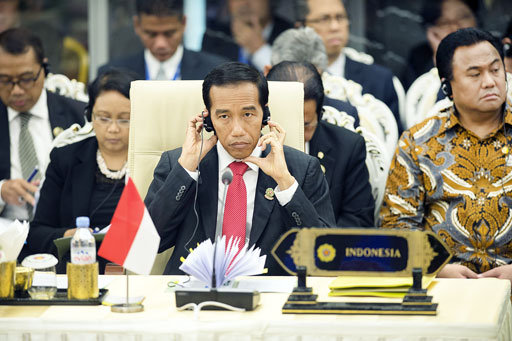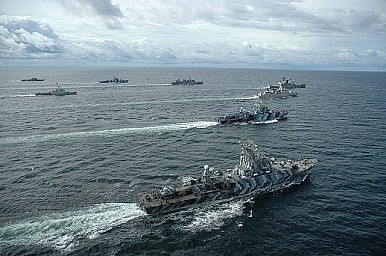 Presenting maritime doctrine
Presenting maritime doctrine
 Amid rising rivalry and a string of border tensions in the region, President Joko "Jokowi" Widodo presented leaders of East Asia and several powerhouse nations with his maritime axis doctrine that will define his administration's policies for the next five years.
Amid rising rivalry and a string of border tensions in the region, President Joko "Jokowi" Widodo presented leaders of East Asia and several powerhouse nations with his maritime axis doctrine that will define his administration's policies for the next five years.
In his speech during the East Asia Summit (EAS) on Thursday, held in Myanmar's new capital, Naypyitaw, Jokowi presented his audience with a complete exposition of his foreign policy doctrine: Indonesia as a maritime fulcrum, the power between two oceans.
Fully aware that a major transition is taking place in the 21st century from the West to East Asia, Jokowi underscored Indonesia's growing importance as a nation that lies at the center of the geographic, economic and political changes that are sweeping across the globe.
"Thus, as a maritime country, Indonesia should assert itself as the World Maritime Axis. This position opens opportunities for Indonesia to develop regional and international cooperation for the prosperity of the people," he said in his five-minute address.
The President also explained that as the World Maritime Axis, Indonesia was certainly interested in participating in determining the future of the Indian and Pacific Ocean region.
"We want the Indian and Pacific Oceans to remain peaceful and safe for world trade instead of being a battlefield for natural resources, territorial conflicts and maritime supremacy," said the former furniture businessman.
Jokowi said that the doctrine hinged on five pillars of action that included ensuring regional security.
Read More ...
 Jokowi’s Maritime Doctrine and What It Means
Jokowi’s Maritime Doctrine and What It Means
 Despite coming into the Indonesian presidency as a man with minimal foreign policy experience, Indonesian president Joko "Jokowi" Widodo has attempted to launch a bold new foreign policy doctrine. Since the end of the Suharto dictatorship, Indonesian presidents have slowly rebuilt the country's clout in regional and international affairs, which diminished greatly in the chaotic post-Suharto era. Former president Susilo Bambang Yudhoyono, though considered mostly a failure as a domestic reformer, did restore Indonesian leadership of ASEAN and play a significant role in helping mediate several regional conflicts.
Despite coming into the Indonesian presidency as a man with minimal foreign policy experience, Indonesian president Joko "Jokowi" Widodo has attempted to launch a bold new foreign policy doctrine. Since the end of the Suharto dictatorship, Indonesian presidents have slowly rebuilt the country's clout in regional and international affairs, which diminished greatly in the chaotic post-Suharto era. Former president Susilo Bambang Yudhoyono, though considered mostly a failure as a domestic reformer, did restore Indonesian leadership of ASEAN and play a significant role in helping mediate several regional conflicts.
Still, no president since Suharto proclaimed so bold a foreign policy doctrine as the former Jakarta mayor just did at the East Asia Summit. The Jokowi doctrine, focused on Indonesia's maritime trade, infrastructure, and security, announces an intention to vastly expand Indonesia's maritime power. Whether the country has the resources and the political will to put Jokowi's grand vision into action remains a serious question.
Read More ...
 Indonesia as a Maritime Power: Jokowi's Vision, Strategies, and Obstacles Ahead
Indonesia as a Maritime Power: Jokowi's Vision, Strategies, and Obstacles Ahead
Earlier this year, electoral debate in Indonesia powered up a national discourse about the country's intent, capabilities, and roadmap as a maritime power in the Indo-Pacific region. Indonesia's newly installed president, Joko Widodo, popularly known as Jokowi, promised in his election manifesto in May 2014 to (1) focus on strengthening Indonesia's maritime security, (2) expand the canvas of regional diplomacy to cover the entire region of the Indo-Pacific, and (3) project the Indonesian navy as a respected regional maritime power in East Asia.[1] He further announced in June 2014 that he aimed to transform Indonesia into a "global maritime axis" (poros maritim dunia).[2] He reaffirmed his vision after being declared victorious in July 2014 and called upon all citizens to "work together to develop Indonesia into a global maritime axis, a global civilizational hub."[3] While taking the oath of office to become Indonesia's seventh president on October 20, 2014, Jokowi reiterated his call to transform Indonesia into a maritime nation and invoked the slogan of "Jalesveva Jayamah" (in the ocean we triumph).[4]
Jokowi's articulations are an important step forward in Indonesia's effort towards developing a grand maritime strategy. His vision goes beyond the idea of merely achieving maritime security and seeks to transform Indonesia into a maritime power. He is the first president in democratic Indonesia to publicly promulgate a maritime security doctrine, taking the debate out of the pages of the policy documents and placing it into the domain of a broader politico-strategic discourse. In light of these debates and discussions, this paper examines Jokowi's ideas and what they mean for Indonesia's grand maritime strategy in the coming years.
Read More ...
